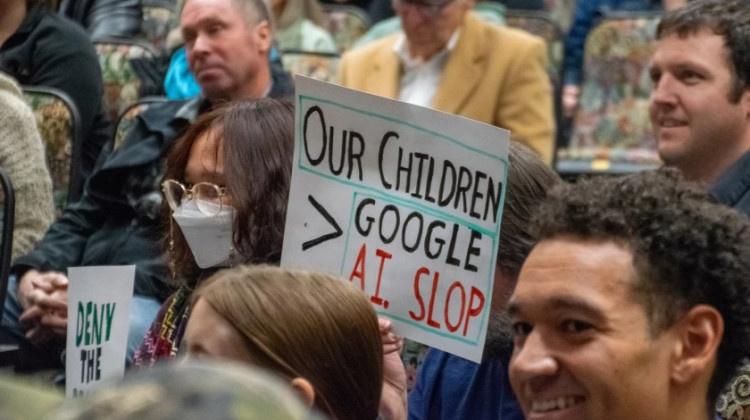
Senate Appropriations Chairman Luke Kenley, R-Noblesville, talks with reporters late Tuesday about a two-year, $31.3 billion budget deal struck by the House and Senate. The General Assembly is expected to approve the budget on Wednesday, the last day lawmakers can act without a special session.
Photo by Lesley Weidenbener, TheStatehouseFile.comINDIANAPOLIS – Most charter schools would get additional money, teachers would get a $100 tax credit and the governor’s regional cities initiative would be funded under a budget compromise the House and Senate reached Tuesday.
The $31.3 billion, two-year plan – which should be approved and sent to Gov. Mike Pence on Wednesday, the last day of the 2015 session – would mean a 2.3 percent increase in K-12 school funding in 2016 and again in 2017.
The school money will be divided among districts in a way that closes the gap between the urban districts with the state’s highest per-student funding and those in suburban areas with lower per-student funding.
But House Speaker Brian Bosma, R-Indianapolis, said the proposal also provides “a softer landing to some of the urban schools that thought they were suffering too much of a loss” under the original budget passed by the House.
Charter schools that have an A, B or C rating would get a $500 per student funding boost under the plan. Under current law, they don’t share in the property tax revenue that traditional public schools receive for buildings, transportation and other costs.
Charters that have a D or F grade could obtain the additional money if they perform at or above the level of the traditional schools in their area. Charters – which are public schools generally operated outside traditional districts and with fewer rules – would also be eligible for loans from the state’s common school fund to help pay for construction and other costs.
Extra funding for charter schools had been a priority for Pence, although lawmaker had been far more skeptical.
“We’re in a sweet spot where everyone can live with it,” said Senate President Pro Tem David Long, R-Fort Wayne.
The budget plan creates an amnesty program that lets tax scofflaws pay up and avoid prosecution. That’s expected to bring in more than $100 million that will be used in part to pay for Gov. Mike Pence’s regional cities initiative, which calls on metro areas to develop and implement strategic plans for development.
Pence wanted $84 million for the plan but the Senate originally slashed the funding. Bosma said Tuesday that Pence will be happy with the compromise.
The Republican majorities in the House and Senate had originally hoped to have the final budget plan finished and posted publicly Tuesday afternoon. But Long said the usual last-minute negotiations over several issues pushed it back. The plan was expected to go online late Tuesday evening.
Meanwhile, legislative leaders spelled out some of the plan’s details.
The budget will include a $100 tax credit for teachers who spend their own money on classroom supplies. House Republicans had originally sought a credit twice that size but Senate Republicans opposed the program. Still, the compromise will cost the state $10 million.
“Sometimes a half a loaf is better than none,” Bosma said. “We are getting a tax credit for every teacher, which was our goal.”
The budget will also include increased performance awards for teachers.
But to afford the additional money for schools and teachers, lawmakers are pulling back on money for roads. Both the House and Senate had put $200 million into the budget each year for special highway projects. That would be on top of the ongoing revenue stream for roads.
The compromise plan cuts that amount in half but lets the State Budget Committee authorize more later if the money is available.
“It is reduced,” Bosma said, “but it’s still high.”
The budget plan boosts funding for higher education by about $45 million – the same amount proposed by the House but less than pushed by the Senate.
“We felt we were going to have to back up a little bit,” said Senate Appropriations Chairman Luke Kenley, R-Noblesville.
The cuts from the original budget proposals became necessary after lawmakers learned earlier this month that they’ll likely have fewer tax dollars to spend in 2016 and 2017 than they thought when they started working on the spending plan.
Long said lawmakers wanted to keep enough reserves in the bank to ensure the state maintained its AAA bond rating, which makes borrowing cheaper, while still boosting funding overall for a few priorities.
“We’re spending a lot of money on education which we’re happy about,” Long said. But the reduced revenue forecast “caused some whittling here and there.”
The budget provides $80 million for local community corrections programs, which are expected to see significant increases in enrollment under sentencing changes the General Assembly made last year. But a separate bill puts considerable “checks and balances” on the way the money is obtained and spent, Kenley said.
There’s no money in the budget to expand two prisons, something Pence had requested.
TheStatehouseFile.com is a news website powered by Franklin College journalism students.
 DONATE
DONATE







 Support WFYI. We can't do it without you.
Support WFYI. We can't do it without you.